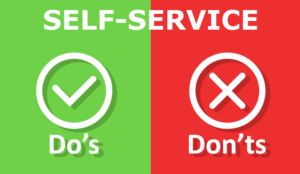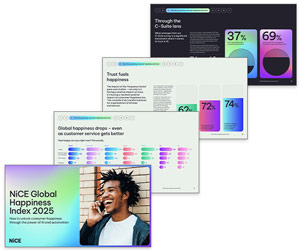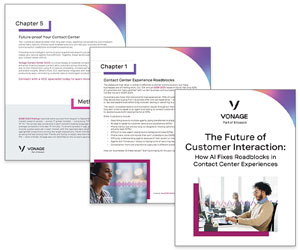Self-service is now widely used to help customers to serve themselves. We recently asked our audience for their tips on how to improve self-service.
1. Align self-service routes to your call drivers
Align self-servicing routes/journeys to call drivers. For example, if a balance enquiry is your biggest call driver, have this at the front of your list.
Educate staff to actively promote self-servicing when a customer contacts you with an enquiry that could have been self-served. Talk the customer through setting up (step by step), while on line.
This may initially increase AHT, but long-term benefits outweigh this education process.
Thanks to Craig
2. Log self-service transactions in the customer records
At our company, while using the Self Service Portal, a user record is generated that is also provided to the Service Desk. Thus, if the user still has to call or start a chat, the agent is already informed about their details and the problem.
Thanks to Jenny
3. Get the design spot-on
Build products and services that are so well designed and intuitive that customers don’t need any help! They just work!
Thanks to Peter
4. Design for a low reading age
When designing self-serve, consider the average reading age of customers and that English may not be their first language.
Thanks to Steven
5. Customer services should own the self-service applications
Make Customer Services the owner of self-service applications. Don’t make it a ‘toy’ for the web developers.
Make sure that new content can be added by Customer Services within minutes.
Thanks to Arno
6. Let the customer draw what they want
Customer usability research is the best thing you can do, especially participatory design research. Let the customer draw what they want. You’ll be amazed by what they share.
Thanks to Niki
7. Offer a discount for self-service
Make it beneficial to your customers. If you offer customers self-service, give them a discount if they use it.
Thanks to Robert
8. Don’t forget your demographics and age ranges
When you design self-service with the customer in mind, don’t forget your demographics and age ranges.
Some of the older generation prefer dealing with a person who can take ownership and who they feel they can trust, so don’t want to use self-service. If you ignore this they could go elsewhere.
Thanks to Rhian
9. Tidy up the FAQs
Remove non-frequent questions to avoid cluttering the self-help. This will therefore make it easier for users to find answers to their frequent question!
Thanks to Michael
10. Self-service works well when the business is closed
Promote self-service at times when the business is closed, like overnight or on public holidays.
Thanks to Lucas
11. Keep it all in synch
Ensure that all service channels are in synch, so customers can move between channels freely and get the same answer. Also include the ability to start something started in one channel and move to another without starting again.
Thanks to Rob
12. Get the customer to feel they own the self-service
Give the customer incentives to use it, prizes or money off!
Thanks to Sarah
13. It’s all about the customer journey
Always think about things from the customer’s point of view
I believe that if the app or site is designed in such a way that it is easy for the customer to use, then they will use it.
Make the product clear enough for all customers to understand and be able to make a decision on what they’re purchasing.
14. Review it regularly
Review your site on a regular basis as customer needs change continuously. Do not think you’ve nailed it and just leave it to tick over.
Thanks to Nikki
15. Provide real-time feedback
Provide real-time feedback on certain self-service actions, for example, acknowledgements or notifications. These should be personalised if possible.
Thanks to Marlene
16. Keep it simple
Keep it simple, ensuring all information presented is clear and easy to understand.
Manage customer expectations from the outset and inform them that they can save time by using the self-serve options available to them.
Thanks to Ed
17. Make it personal
Present a customised self-service to individual customers based on the status of their orders.
Thanks to Tim
18. Add social media buttons
Make your app or self-service shareable by the user through social media. This is an effective way for self-promotion.
Thanks to Nick
19. Don’t hide your contact channels
Be aware that customers don’t want to contact you either. So don’t hide your contact channels, but show them alongside your self-service content.
20. Capture the visitor’s intent
Have a good search solution that captures the visitor’s intent, not just gives results based on keywords. It should also hook into the ‘assisted channels’, e.g. a chat could be offered if someone searches on a complaint or to cancel a subscription.
Thanks to K
21. Involve customer service agents in the design
Involve agents as well as architects in designing any call flow, as they have to take the final call.
Thanks to Shane
22. Remember who your customers are
Remember who your customers are (age, culture, background, and financials). They may not have access or don’t know how to use high-tech solutions.
Thanks to Beatriz
23. Look at what customers find frustrating
Start with the basics – look at what the customers find frustrating and what they would like to be able to do, then build the solution around them. Make the solution sexier and better!!
For example, we sell tickets and have a virtual view from a seat if you book online. This is not available over the phone.
Thanks to Penny
24. Run a proof of concept
Run proofs of concepts, pilots and post-deployment applications, tuning to optimise customer acceptance and containment.
Thanks to Darren
25. Sell the benefits to the customer
Promote the benefits of self-service. For example, it is available 24/7, no queuing, instant etc.
26. Build an overall customer experience programme for your customers
Build an overall customer experience programme for your customers that incorporates a variety of communication channels. That way you will be meeting the many needs of customers and not just constantly appearing to divert people away from trying to speak to a live person. A variety of channels will allow people to, in time, naturally use a specific channel based on query type.
Thanks to Stuart
27. Auto-response emails
A simple-to-do tip, that is often overlooked, is to set up auto-response emails. Make sure the emails link to an operational webpage as well as to social media, FAQs and telephone number, if appropriate.
Thanks to James
28. Test it with a mix of customer profiles
Test it first with a mix of customer profiles – e.g. young and more mature customers.
Thanks to Sharon
29. Don’t deviate from your objective
Think about your objective throughout and what you want to achieve. Don’t deviate from this and keep it simple!
Thanks to Jon
30. Could your Mum or Dad use it?
Think like a customer and ask… Could your Mum or Dad just use it without being shown anything?
Thanks to Carl
31. Use analytics to understand the customer journeys
Use analytics to truly measure take-up and understand journeys taken. Then take action on the information you glean.
32. Don’t waste time on things that are not suited to self-service
Self-service needs to be part of a larger channel strategy. Concentrate on moving suitable contacts away from traditional telephony channels, thus opening up telephony (for example) for the people who need it.
Some transactions are simply not suitable for self-service because of their sensitivity (for example) so don’t waste time trying. Focus on what can be shifted.
Thanks to Kieran
33. Use personalisation!
Customers will be happy if they feel like you know them personally. For example, when you know their name, know their needs and know all their previous customer experiences.
This is the key for a satisfied customer.
Thanks to Artamonov
34. Get staff buy-in
Staff need to be included as part of the development process. This will help gain their buy-in.
Thanks to Nemash
35. Use video
We are moving to elevating the power of social media combined with video’s ability to engage by creating a community and processes in which self-service users participate in our video content creation. After all, they are the ones using our products and services.
Thanks to Scott
36. Triage customers
We are using a triage idea to aid customers who come into our Customer Service Centre, to retrain the customers in using the website. In time, they will be more confident in using this self-service facility.
Thanks to Bradley
37. Make use of forums
We offer forums as a communication channel. It encourages peer-to-peer support within our customer community.
For every post made, 10 people are reading the answer, as opposed to webchat/email, where answers are not recycled amongst users.
It also serves as brand building as consumers see staff available/present and there to help.
Thanks to Richard
Do you have any tips for self-service? Why not add them
Author: Jo Robinson
Published On: 16th Jan 2013 - Last modified: 22nd Jul 2021
Read more about - Hints and Tips, Customer Service, Self Service




















